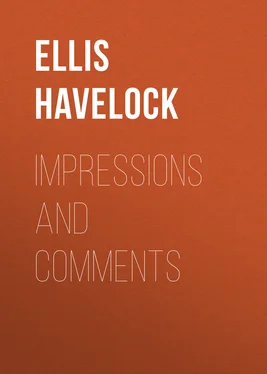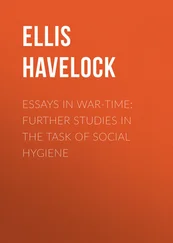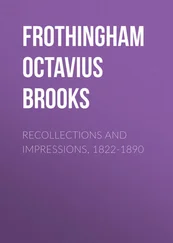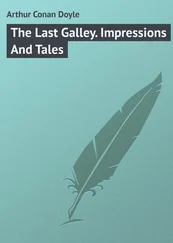Havelock Ellis - Impressions and Comments
Здесь есть возможность читать онлайн «Havelock Ellis - Impressions and Comments» — ознакомительный отрывок электронной книги совершенно бесплатно, а после прочтения отрывка купить полную версию. В некоторых случаях можно слушать аудио, скачать через торрент в формате fb2 и присутствует краткое содержание. Жанр: foreign_prose, foreign_antique, на английском языке. Описание произведения, (предисловие) а так же отзывы посетителей доступны на портале библиотеки ЛибКат.
- Название:Impressions and Comments
- Автор:
- Жанр:
- Год:неизвестен
- ISBN:нет данных
- Рейтинг книги:4 / 5. Голосов: 1
-
Избранное:Добавить в избранное
- Отзывы:
-
Ваша оценка:
- 80
- 1
- 2
- 3
- 4
- 5
Impressions and Comments: краткое содержание, описание и аннотация
Предлагаем к чтению аннотацию, описание, краткое содержание или предисловие (зависит от того, что написал сам автор книги «Impressions and Comments»). Если вы не нашли необходимую информацию о книге — напишите в комментариях, мы постараемся отыскать её.
Impressions and Comments — читать онлайн ознакомительный отрывок
Ниже представлен текст книги, разбитый по страницам. Система сохранения места последней прочитанной страницы, позволяет с удобством читать онлайн бесплатно книгу «Impressions and Comments», без необходимости каждый раз заново искать на чём Вы остановились. Поставьте закладку, и сможете в любой момент перейти на страницу, на которой закончили чтение.
Интервал:
Закладка:
September 10 .—It was an overture by Elgar, and the full solemn sonorous music had drawn to its properly majestic close. Beside me sat an artist friend who is a lover of music, and regularly attends these Promenade Concerts. He removed the cigarette from his lips and chuckled softly to himself for some moments. Then he replaced the cigarette and joined in the tempestuous and prolonged applause. I looked at him inquiringly. "It is a sort of variation of the theme," he said, "that he sometimes calls the Cosmic Angels Working Together or the Soul of Man Striving with the Divine Essence." I glanced at the programme again. The title was "Cockaigne."
September 17.—It has often seemed to me that the bearing of musical conductors is significant for the study of national characteristics, and especially for the difference between the English and the Continental neuro-psychic systems. One always feels inhibition and suppression (such as a Freudian has found characteristic of the English) in the movements of the English conductor, some psychic element holding the nervous play in check, and producing a stiff wooden embarrassed rigidity or an ostentatiously languid and careless indifference. At the extreme remove from this is Birnbaum, that gigantic and feverishly active spider, whose bent body seems to crouch over the whole orchestra, his magically elongated arms to stretch out so far that his wand touches the big drum. But even the quietest of these foreign conductors, Nikisch, for example, gives no impression of psychic inhibition, but rather of that refined and deliberate economy of means which marks the accomplished artist. Among English conductors one may regard Wood ( lucus a non lucendo! ) as an exception. Most of the rest—I speak of those of the old school, since those of the new school can sometimes be volatile and feverish enough—seem to be saying all the time: "I am in an awkward and embarrassing position, though I shall muddle through successfully. The fact is I am rather out of my element here. I am really a Gentleman."
October 2.—Whenever I come down to Cornwall I realise the curious contradiction which lies in this region as at once a Land of Granite and a Land of Mist. On the one hand archaic rocks, primitive, mighty, unchanging, deep-rooted in the bases of the world. On the other hand, iridescent vapour, for ever changing, one moment covering the land with radiant colour, another enveloping it in a pall of gloom.
I can also see two contradictory types of people among the inhabitants of this land. On the one hand, a people of massive and solid build, a slow-moving people of firm, primitive nature, that for all their calm stolidity may give out a fiery ring if struck, and will fearlessly follow the lure of Adventure or of Right. On the other hand, a race of soft and flexible build, of shifting and elusive mind, alert to speak and slow to act, of rainbow temperament, fascinating and uncertain. Other types there may be, but certainly these two, whatever their racial origin, Children of the Granite and Children of the Mist. October 3.—It has often interested me to observe how a nation of ancient civilisation differs from a nation of new civilisation by what may be called the ennoblement of its lower classes. Among new peoples the lower classes—whatever fine qualities they may possess—are still barbarians, if not savages. Plebeian is written all over them, in their vulgar roughly-moulded faces, in their awkward movements, in their manners, in their servility or in their insolence. But among the peoples of age-long culture, that culture has had time to enter the blood of even the lowest social classes, so that the very beggars may sometimes be fine gentlemen. The features become firmly or delicately moulded, the movements graceful, the manners as gracious; there is an instinctive courtesy and ease, as of equal to equal, even when addressing a social superior. One has only to think of the contrast between Poland and Russia, between Spain and Germany.
I am frequently reminded of that difference here in Cornwall. Anywhere in Cornwall you may see a carter, a miner, a fisherman, a bricklayer, who with the high distinction of his finely cast face, the mingling in his manner of easy nonchalance and old-world courtesy, seems only to need a visit to the tailor to add dignity to a Pall Mall club. No doubt England is not a new country, and the English lower social classes have become in a definite degree more aristocratic than those of Russia or even Germany. But the forefathers of the Cornish were civilised when we English were a horde of savages. One may still find humble families with ancient surnames living in the same spot as lived, we find, if we consult the Heralds' Visitations, armigerous families of the same name in the sixteenth century, already ancient, and perhaps bearing, it is curious to note, the same Christian names as the family which has forgotten them bears to-day.
So it is that in that innate ennoblement which implies no superiority either of the intellect or of the heart, but merely a greater refinement of the nervous tissue, the Cornish have displayed, from the earliest period we can discern, a slight superiority over us English. Drake, a man of this district if not a Cornish-man, when sailing on his daring buccaneering adventures, dined and supped to the music of violins, a refinement which even his Pole-hunting successors of our own day scarcely achieved. Raleigh, partly a Cornishman, still retains popular fame as the man who flung his rich cloak in the mud for the Queen to step on. To-day a poet of Cornish race when introduced in public to Sarah Bernhardt, the goddess of his youthful adoration, at once kissed her hand and declared to her that that was the moment he had all his life been looking for. But we English are not descended from the men who wrote the Mabinogian ; our hearts and souls are expressed in Beowulf and Havelok , and more remotely in the Chanson de Roland . We could not imitate the Cornish if we would; and sometimes, perhaps, we would not if we could.
October 4.—I lay with a book on the rocks, overlooking a familiar scene, the great expanse of the sands at low tide. In the far distance near the river was a dim feminine figure in a long coat, accompanied by three dogs. Half an hour later, when I glanced up from my book, I chanced to notice that the slender feminine figure was marching down to the sea, leaving a little pile of garments on the middle of the sands, just now completely deserted. The slender figure leisurely and joyously disported itself in the water. Then at length it returned to the little pile, negligently guarded by the dogs, there was a faint radiance of flesh, a white towel flashed swiftly to and fro for a few moments. Then with amazing celerity the figure had resumed its original appearance, and, decorously proceeding shorewards, disappeared among the sand dunes on the way to its unknown home.
In an age when savagery has passed and civilisation has not arrived, it is only by stealth, at rare moments, that the human form may emerge from the prison house of its garments, it is only from afar that the radiance of its beauty—if beauty is still left to it—may faintly flash before us.
Among pseudo-Christian barbarians, as Heine described them, the Olympian deities still wander homelessly, scarce emerging from beneath obscure disguises, and half ashamed of their own divinity.
October 5.—I made again to-day an observation concerning a curious habit of birds and small mammals which I first made many years ago and have frequently confirmed. If when I am walking along near banks and hedges, absorbed in my own thoughts, and chance suddenly to stand still, any wild creature in covert near the spot will at once scuttle hastily and noisily away: the creature which had awaited the approaching tramp in quiet confidence that the moment of danger would soon be overpast if only he kept quiet and concealed, is overcome by so sudden a panic of terror at the arrest of movement in his neighbourhood that he betrays his own presence in the impulse to escape. The silence which one might imagine to be reassuring to the nervous animal is precisely the cause of his terror. It is a useful adaptation to the ways of the great enemy Man, whether it is an adaptation resulting from individual experience or acquired by natural selection. From the stand-point of wild animality it is the Silence of Man that is ominous.
Читать дальшеИнтервал:
Закладка:
Похожие книги на «Impressions and Comments»
Представляем Вашему вниманию похожие книги на «Impressions and Comments» списком для выбора. Мы отобрали схожую по названию и смыслу литературу в надежде предоставить читателям больше вариантов отыскать новые, интересные, ещё непрочитанные произведения.
Обсуждение, отзывы о книге «Impressions and Comments» и просто собственные мнения читателей. Оставьте ваши комментарии, напишите, что Вы думаете о произведении, его смысле или главных героях. Укажите что конкретно понравилось, а что нет, и почему Вы так считаете.












